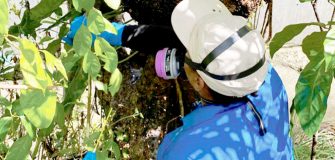Share
The International Federation of Organic Agriculture Movements (IFOAM) defines organic farming: “Organic agriculture is a production system that sustains the health of soils, ecosystems and people. It relies on ecological processes, biodiversity and cycles adapted to local conditions, … Organic agriculture combines tradition, innovation and science to benefit the shared environment and promote fair relationships and a good quality of life for all involved…”
Eating green means to eat locally-produced, organic and seasonal food. When you buy and eat locally, you are boosting your local economy and reducing greenhouse gas emissions required to get food on your plate. Eating organically reduces the consumption of harmful chemicals, pesticides, antibiotics and added hormones.
Organic farming means responsible land use and farming practices. It is an agricultural management system which preserves, replenishes, and enhance ecological stability. It ensures the use of natural materials in the growing and nurturing of crops and animals, avoiding the use of synthetic substances to maintain soil fertility and ecological balance. Organic farming is a farming method that involves growing and nurturing crops from seeds which are not genetically modified and without the use of synthetic based fertilizers and pesticides. Organic Farming is based on ecologically balanced agricultural principles like crop rotation, green manure, organic waste, biological pest control, mineral and rock additives, utilizing natural pesticides and fertilizers.
Organically grown fruit and vegetables are rich in nutrients as the mineral and vitamin content are enhanced from the nutrients in the soil. Organic farming techniques eliminate the effects of harmful toxins which may cause diseases. Although here in our islands, we do not have organic certification, farmers are returning to traditional methods to produce quality food. Fruits and vegetables produced locally are delivered straight from the farm to the customer with no long delays. You can get organic foods direct from the source at reasonable prices. Locally grown fruits and vegetables usually are better tasting than food which has travelled thousands of miles to reach our supermarkets. Organic farming methods are environmentally friendly using naturally produced compost.
In the past, food grown for consumption in the Virgin Islands was produced organically. The planters depended on the natural fertility of the soil, using biodegradable waste from the previous crops to fertilize the soil for the next crop. The chemicals now being used as pesticides and fertilizers are all produced as downstream products of the petrochemical industry. Carbon emissions from this industry constitute one of the major causes for concern, as we watch the effects of climate change unfold before our very eyes.
Farming on the hilly terrain in these islands also required skill and ingenuity. Terracing of the slopes was meticulously done by hand to protect the topsoil and prevent loss by erosion. In the traditional system of mixed farming nothing went to waste. The cycle was complete as animals were fed grass and crop waste, and in turn animal waste was returned to the soil as a natural fertilizer to provide nutrients for the next crop.
Historically, the agricultural system in these islands minimized soil disturbance, added no dangerous pesticides or manufactured fertilizers to the ecosystem, replaced nutrients removed from the soil, and generally maintained the existing ecosystem. Later as the production of fertilizers and pesticides proliferated, their use became widespread and farmers turned to these chemicals to add nutrients to the soil and control pests and diseases.
Fortunately, in recent decades, the return to organic farming is becoming popular again. Farmers are turning away from the heavy use of these chemicals, which harmed the environment, contaminated other crops, and polluted the groundwater. The loss of wildlife and the adverse effects on human health will eventually lead to the reduction in the use of theses harsh and dangerous chemicals. In a sense, because of our changing attitudes to farming, we are returning to more traditional production systems. This is a welcome change. Today, consumers of locally produced meat and vegetables can often expect to get products grown without hormones or dangerous pesticides. Consumers should buy local and support the farmers who have returned to this traditional form of agriculture.
There is need for a greater farming effort. Previously, apart from times of drought or hurricane, the Virgin Islands produced enough food to feed its inhabitants, and exported the surplus. Although the population has since grown tremendously, and its consumption taste has changed, a greater emphasis can be placed on the production of fruits, vegetables, poultry and small animals.
These islands have moved from being a net exporter of food to importing close to 95% of the food consumed locally. Although Hurricane Irma devastated agricultural production in 2017/2018, farmers have returned to producing for the local market.
With all the current techniques available, growing our own food is not as difficult as you may think. With some imagination and creativity, we can use green tools to grow local and eat local. Eating food grown in your garden will help to improve your physical and mental health and contribute to the reduction in global warming.
If organic farming is to be a success, the government and the community must play a vital role by supporting the local farmers. GO GREEN- GROW LOCAL, EAT LOCAL should become a mantra that we should chant.



